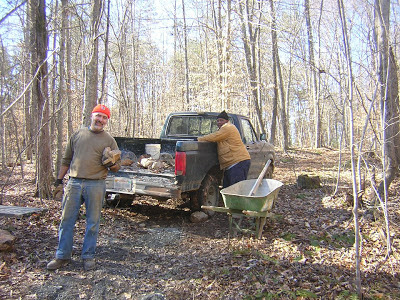It was pleasing, in a culture that often makes a fetish of the pickup truck, to see the vehicle in the book as just another essential tool.
So which truck should a Tractorpunk own?
First off, there probably is no such thing as a perfect truck. I could also care less about brand loyalty. I'm partial to Fords because my dad drove big ones to haul produce, but any truck that runs well is a good truck to me. Every truck owner can describe the truck that felt right, that did the best work before, sadly, it had to be "put down" like a beloved farm animal who had reached the end of its life.
Second off, I've never owned that perfect truck. My closest-to-perfect one was a '95 white contractor's F-150 called "The Bull" (that's me and The Bull outside Brewer's General Store in Camp, VA). It came pre-dented and lacked four-wheel drive. It also rode like a buckboard wagon, though in the end getting stuck in mud too many times in the back parts of the property, even with a locking differential, meant a change had to come. I'll probably buy it back one day if Jimmy, the present owner, tires of it.
My current truck, an '03, Chevy, has 4WD but also the personality of a recliner. It's unassuming and useful, but rather bland. I miss the old buckboard ride and hand-cranked windows of The Bull or a '98 Dodge Dakota that was great on gas and the right size, not too big or small, but very unreliable.
I'm surprised how few miles we drive our truck, which is good because it drinks gas. I'm also surprised how often it hauls things about. It would seem that work-trucks have three categories:
- Small four-cylinder haulers for dump runs or moving stuff from house to barn or field. Often I see older 2WD trucks in this role, since compacts are scarce on the late-model market. These trucks won't tow much.
- Larger contractor or used trucks like The Bull or my Chevy. They are great for lots of purposes, including light towing. The 8' bed on many of them makes hauling lumber, gravel, or firewood a reasonable chore.
- The big dogs, often full-sized diesels of the "one ton" category. These can tow a big tractor or haul lots of gear in the bed or on a trailer.
I suspect that many new homesteaders would love to go straight to the big dog, since it could do anything, but we decided against that sort of expense ($40,000 plus). We do occasionally move farm equipment, but we found that for $100-$200, the guys who service the tractors (when I can't) will transport them.
In time, I'll find the perfect truck. It would be something like the diesel Hilux Toyotas I see in England, or my dream Jeep pickup, like the J12 concept they rolled out last year. . . maybe one day, and used, given my budget and propensity for punishing my trucks. I don't want to put in the first scratch.
Before buying a truck, my wife and I made a list of what we absolutely needed. It ran:
- 4WD: not everyone needs it, but if you go back into the mud to work the truck, you'll thank yourself for the extra expense
- Extended cab: even with a nice roll-down tonneau cover, water seeps into the bed. Things that need to stay dry could go into a tool box (especially on a beauty like the J12) but extended cabs still permit a truck bed that is not a joke
- 8 Foot Bed: at the time, we planned to renovate our farmhouse. I saved thousands of dollars by running the crew materials. When I ran into 16' lumber, however, I had to have it delivered. But a 6.5' bed would still have worked, had I installed a ladder rack on top.





